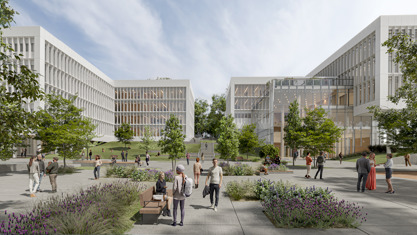

Version Update: “Not Engineer Training, but an Engineering Education”
Knowing the professional literature is important, and understanding Maxwell’s equations certainly is. But what about giving presentations in English, teamwork, and perhaps the most important Israeli quality of all: knowing how to ask questions? These and more are the skills and values that future engineers must cultivate – and this is how academia can instill them.
What makes an engineer better? This question is more difficult than it seems. The answer frequently changes, because the world around us is constantly changing, and because engineers are the ones who are meant to reinvent it.
Yaniv Garty, until recently CEO of Intel Israel, is convinced that at least in the deep-tech professions – artificial intelligence, microchips, quantum, telecom – there’s no substitute for the academic track. But this track is in need of a version update. “Academia is excellent at instilling technical knowledge, teaching Maxwell’s equations or one more theoretical chapter. That isn’t the problem, especially when everything is becoming more accessible and there’s no need to recite and memorize as much. But from what we’re seeing among juniors in the industry, the vital skills component is lacking.” The skills he seeks aren’t about IQ, but more about EQ: emotional intelligence, qualities identified with the right hemisphere of the brain – creativity, imagination, and seeing the big picture, as well as connecting these to the more analytic side.
As a concrete example, Garty cites three languages that college students, and preferably earlier as high school students, should learn: English – “not in the heavy grammar sense, but as a language of capability, of honing and presenting an idea, of creating momentum, enlisting outside parties, and making others join me, because that’s what you do in innovation”; digital skills – working with the digital space and not just being in it, e.g., through robotics or computer animation; and math, which is a way of thinking.
Additionally, Garty highlights the ability to work together, whether in pairs or in large teams. “The problems we face technologically are such that even the smartest person on earth couldn’t solve them alone. And in order to work together, you must learn to let go of your ego, and ask questions in a way that doesn’t limit things but opens them up.” The ability to ask questions correctly and see things differently, he says, is an Israeli differentiator. “It’s crucial for innovation, and we have it in our culture, but in order to preserve it, it’s time we formalize this key quality.” How? Here academia already has the tools: teach engineering, exact science, or computer science students history, philosophy, and even music as well. “Anything to help them open their minds and think differently. Step out of their comfort zone and develop new mental muscles.”
13 Skills
Nowadays, Garty’s messages and those of the industry find willing ears in academia. Prof. David Berla, head of the Electrical Engineering School at Afeka – the Academic College of Engineering in Tel Aviv, is firmly convinced: “We need to make a mental switch. We don’t ‘train’ engineers, but provide an engineering education. It’s much more holistic and requires profound, far-reaching improvements. Not just to teach scientific and engineering principles, not just to scribble on formula sheets, but also to instill vital skills along with social and behavioral values.”
“The Afeka Framework” for the figure of the alumnus, formulated in collaboration with industry leaders, lists 13 vital skills, including: critical thinking, multidisciplinary teamwork, effective communication, self-learning, complex problem-solving, integrating different subjects, and more. Once the list was formulated, Afeka mapped all the courses taught at it. At each course, the learning outcomes and the skills acquired during the course were examined, in terms of both the ideal and reality. The skills themselves were each divided into three levels – basic, intermediate, advanced – such that every course is required to bring students not only to the level of particular scientific and engineering knowledge, but also to the skill level. Of course, not every field requires the same entire package of skills – ethics, for example, is much more crucial in medical engineering and AI, and less so in electrical engineering. But the principle is upheld, updated, and validated over time, and even communicated to the students.
And if developing this entire methodology has been a complex undertaking, then implementing it is doubly so. Afeka has developed an entire system for the promotion of teaching, aimed at fostering and integrating advanced learning methods, such as PBL (project-based learning) and flipped classrooms (where work is done at home and class time is devoted to a fruitful discussion). “It’s no longer the standard approach, with a lecturer talking and writing on the whiteboard, and everybody copying it down and leaving. The students are part of the learning, they have assignments, projects, and mini-projects, they see a big picture and acquire a comprehensive toolset for their careers and lives. This is complemented by the values – such as being a mensch, adopting a culture of dialogue, learning to listen and not just lob in the first answer that comes to mind, and admitting mistakes.”
The next step in the framework will be a fundamental change to the formative assessment and feedback component, be it an auditor at a course who will examine the extent to which vital skills are being integrated, or some AI mechanism that will do this autonomically. In the meantime, feedback from Afeka students and alumni, and the fact that 97% of them are employed in a broad range of roles, including management and leadership roles, speak for themselves. Says Prof. Berla: “This is only the beginning, but we’re already seeing signs and positive outcomes. The juniors are integrating well, and say that they fully appreciate the significance of the tools we’ve given them and use them daily.”
“This kind of dialogue is of the utmost importance today,” says Garty, praising Afeka College for “making it the apple of its eye and working tirelessly on it. For understanding that it’s extremely important to teach skills, and that in order to do so, we must examine not only the outcomes but also the process.” And the process, he adds, matters not just to employers, the industry, or the Israeli economy, but first and foremost to the alumni themselves. “I myself had an unwritten agreement: study engineering and you’ll have a job for life. That’s gone now. The world is changing, engineering professions are changing, and it’s all about lifelong learning. That’s why developing the learning muscle is so vital.”




Future Engineers
Share a link using:
https://external.afeka.ac.il/en/afeka-news/magazine/future-engineers/WhatsApp
Facebook
Twitter
Email
https://external.afeka.ac.il/en/afeka-news/magazine/future-engineers/